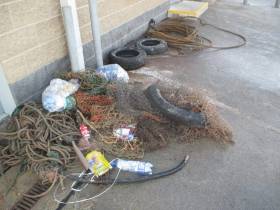Displaying items by tag: NIFHA
Fishing for Litter Scheme Extends Across North's Fishing Ports
#FishingForLitter - Fishing is one of the most tried and tested industries people have ever invented as we have been fishing for thousands of years. The way fish are caught has been transformed many times, but the core ideas remain. We hope the industry will be here for thousands of years to come and that’s why Northern Ireland Fishery Harbour Authority (NIFHA) in conjunction with Department of Agriculture, Environment and Rural Affairs (DAERA) and KIMO have developed Fishing for Litter (see facebook)
Years ago, the conventional wisdom was that the oceans were so vast any pollution would be diluted into safe measures. We now know this is wrong. Smaller sea creatures feed on waste, which in turn makes its way up the food chain to us. That’s bad for us to eat, and also poses a problem for the fishing industry
In recent decades, the problem has exploded because of the extensive use of petrochemical products such as plastic and oil based [paints which don’t occur naturally. Nature has no way to deal with these, so they remain in the sea causing damage to the habitats and wildlife that live there
How it Works
Boats catch litter in their nets and so each boat is supplied with a durable reusable waste bag, to store this litter until they return to the Harbour. On return to port, the skipper contacts the operational Manager to arrange collection.
The fishermen land the bag of litter, where a member of the operations team will collect it.
The operational team collect this litter using the forklift and bring it to the waste compound for sorting. Waste is recycled where possible and the rest is disposed of responsibly using local specialists.
The Net Result
For coastal towns like Warrenpoint, Kilkeel, Ardglass and Portavogie cleaner seas can have a great impact on the quality of Life By removing waste from the water around us, sea life will be able to thrive. Our Beaches will be much nicer to use, because they’ll be cleaner and safer. For fishermen, there will be less damage to the nets and less catch lost to contamination.
About the Scheme
Fishing for Litter is a project funded by DAERA which is being extended across Northern Ireland Fishing ports. The Scheme, which initially launched in Ardglass and extended to Kilkeel and Portavogie will now be introduced to Warrenpoint Harbour.





























































